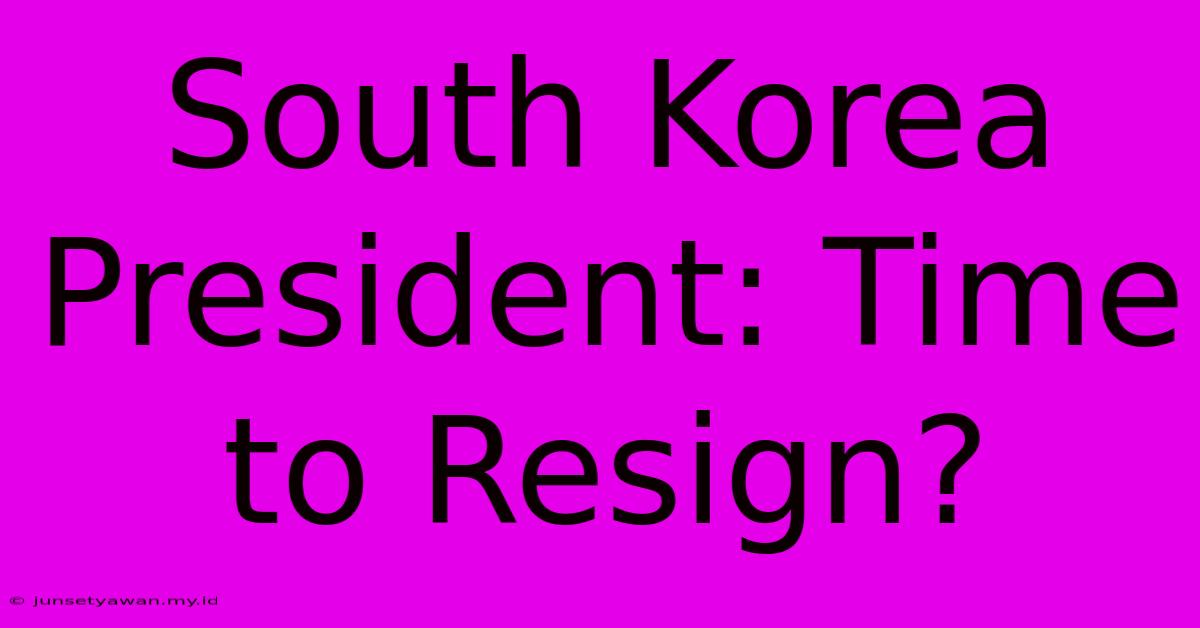South Korea President: Time To Resign?

Temukan informasi yang lebih rinci dan menarik di situs web kami. Klik tautan di bawah ini untuk memulai informasi lanjutan: Visit Best Website meltwatermedia.ca. Jangan lewatkan!
Table of Contents
South Korea's President: Is it Time to Resign? A Look at the Current Political Climate
The recent controversies surrounding South Korea's president have sparked intense debate: is it time for the president to resign? This question weighs heavily on the minds of many South Koreans and international observers alike. The current political climate is fraught with tension, demanding a thorough examination of the situation and its potential consequences. This article will delve into the key issues driving the calls for resignation, analyzing the arguments for and against, and ultimately assessing the potential impact on South Korea's future.
The Mounting Pressure: Key Controversies and Public Opinion
Several significant events have fueled the calls for the president's resignation. These include allegations of [Specific Allegation 1, e.g., corruption], [Specific Allegation 2, e.g., abuse of power], and [Specific Allegation 3, e.g., mishandling of the economy]. Public opinion polls consistently reveal declining approval ratings for the president, with a significant portion of the population demanding accountability. The constant barrage of negative news coverage and public protests further amplify the pressure. Understanding the public's sentiment is crucial to comprehending the gravity of the situation and the urgency surrounding the calls for the president's resignation. This dissatisfaction stems not only from the alleged scandals themselves but also from a perceived lack of transparency and accountability from the presidential office.
Arguments For and Against Resignation: A Balanced Perspective
The arguments in favor of resignation center on the need for restoring public trust and ensuring political stability. Supporters argue that the president's continued presence in office undermines the integrity of the government and erodes public confidence in its institutions. They believe that a resignation would allow for a smoother transition of power and pave the way for a more transparent and accountable administration. Furthermore, continuing to serve while facing serious allegations could be seen as an obstruction of justice.
Conversely, opponents of resignation often cite the importance of maintaining political stability during a period of uncertainty. They may argue that a sudden departure could trigger a constitutional crisis, potentially destabilizing the nation and hindering its economic progress. Some may also argue that due process should be allowed to run its course, and that a resignation would circumvent a fair trial or investigation. They may express concern over the potential disruption of ongoing policy initiatives and international relations. This argument often highlights the potential risks associated with a sudden change in leadership.
The Potential Impact on South Korea: A Nation at a Crossroads
The decision of whether or not the South Korean president should resign carries significant implications for the nation. A resignation would undoubtedly lead to a period of political transition, potentially impacting economic policies, foreign relations, and the overall stability of the country. The subsequent election process, if necessary, could further disrupt the political landscape. The long-term effects on public trust in government and the democratic process are also significant factors to consider. The lack of a clear successor could further complicate matters, creating even more uncertainty for the future. The future stability and economic growth of South Korea are, therefore, intricately linked to the handling of this pivotal moment in its political history. Considering the international significance of South Korea's role in the region, the implications extend beyond its borders.
Ultimately, the question of whether the South Korean president should resign is a complex one with no easy answers. It requires a careful consideration of the various factors involved, including the severity of the allegations, public opinion, potential political consequences, and the long-term impact on the nation. Only time will tell how this critical situation will unfold and what its consequences will be for South Korea's future. The ongoing debate surrounding the South Korea's President and their position necessitates a continued vigilant monitoring of the unfolding events.
Meta Description: Should South Korea's President resign? This article analyzes the controversies, public opinion, and potential impacts of a resignation on the nation's future. Read more to understand the complexities of this critical political moment.

Football Match Schedule
Upcoming Matches
Latest Posts
Terimakasih telah mengunjungi situs web kami South Korea President: Time To Resign?. Kami berharap informasi yang kami sampaikan dapat membantu Anda. Jangan sungkan untuk menghubungi kami jika ada pertanyaan atau butuh bantuan tambahan. Sampai bertemu di lain waktu, dan jangan lupa untuk menyimpan halaman ini!
Kami berterima kasih atas kunjungan Anda untuk melihat lebih jauh. South Korea President: Time To Resign?. Informasikan kepada kami jika Anda memerlukan bantuan tambahan. Tandai situs ini dan pastikan untuk kembali lagi segera!
Featured Posts
-
Nueva Pesadilla Para Mbappe
Dec 04, 2024
-
My 2024 Wrapped Music Playback
Dec 04, 2024
-
Prediksi Leicester Vs West Ham 4 Desember
Dec 04, 2024
-
5 Fakta Menarik Arsenal Vs Mu Liga Inggris
Dec 04, 2024
-
Triunfo De Racing Se Acerca A La Pelea
Dec 04, 2024
